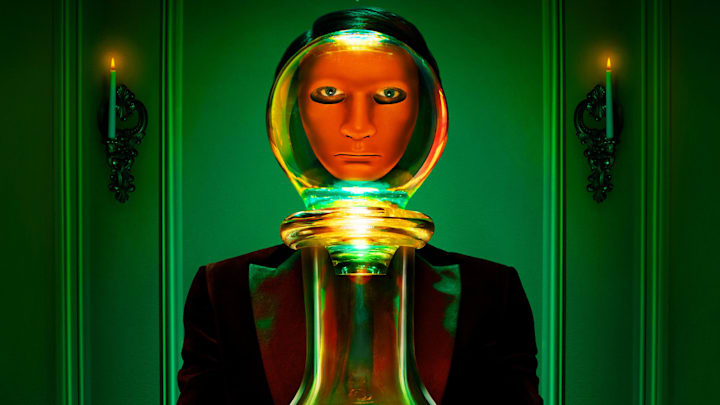As part of its annual "Huluween" event, Hulu has released five new episodes of the American Horror Story spinoff series American Horror Stories. The first new installment stars Michael Imperioli as an Academy Award-winning screenwriter dealing with the trauma of losing his son, Roman.
Daniel (Imperioli) keeps opening doors leading to unnervingly empty rooms, like an abandoned grocery store. He eventually tracks down a man named Eli (Matthew Maher) online who has managed to take video footage of these spaces, identical to what Daniel has encountered.
Now imprisoned, Daniel visits Eli in jail. Eli tells him how he first stumbled upon the "Backrooms." He got into a car accident resulting in the death of a cyclist. It's Eli's fault. He'd been on his phone when he hit the woman, but he lies to the police, claiming his victim ran the stop sign. That lie follows him everywhere, causing him to dissociate from the guilt and making it easy for him to transcend reality into the Backrooms. It's only when he tells the truth that he's finally able to get free, though it results in him going to jail.
What are the Backrooms?
Most people who frequent internet spaces are aware of the Backrooms as a concept. It's a phrase that has been floating around for several years now, reportedly originated in 2019 by thread started on 4chan in 2019, per Vice.
From there, the idea took off and has since cemented itself as part of the internet's vast mythology, similar to other internet legends like Slenderman. There are multiple subreddits dedicated to the Backrooms now, in addition to a YouTube series of shorts, at least one video game, and a planned A24 film.
The idea of the Backrooms stems from the eerie feeling you get when you see a specific type of empty room or space, one that evokes the uncanny valley and a sense of discomfort. These areas are often referred to as "liminal spaces," usually transitional in nature. So locations like airports and hallways, places that only exist to transport you from one location to another. Abandoned locations can also qualify, like old shopping centers or abandoned strip malls. Think Skinamarink.
What happens to Daniel?
The episode slowly reveals that Daniel murdered his son and then buried his body. When the police find a security camera exposing Daniel's crime, they bring a SWAT team to his house to arrest him. Daniel refuses to confess and instead pulls a gun on the cops. The confrontation ends in a shootout, with Daniel presumably dying and getting permanently transported to the Backrooms—his personal hell.
Earlier in the episode, Daniel rambles about how hell is a human concept that we've manifested and created. So he's quite literally become responsible for his own eternal damnation. Fitting, then, that the episode ends with Daniel stuck in a waiting room (another perfect example of a liminal space). There, Daniel is instructed to take a number—it's an 18-digit number, meaning it's well into the quintillions.
For perspective, the ticker on the wall says they're only serving person number 1. He's never leaving that room. He will be stuck in that "Backroom" for eternity. I'm sure even jail would be preferable to that kind of existential torment.
All five new episodes of American Horror Stories are now available on Hulu as part of season 3B.
